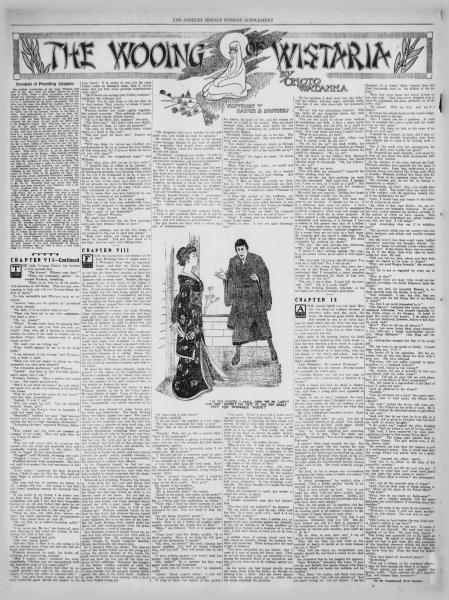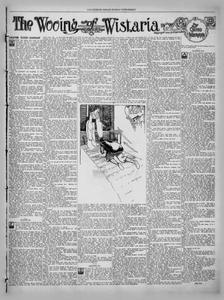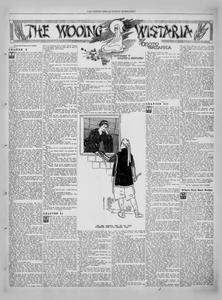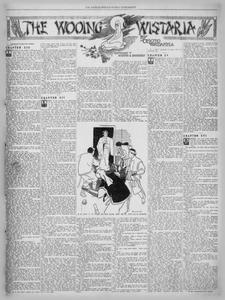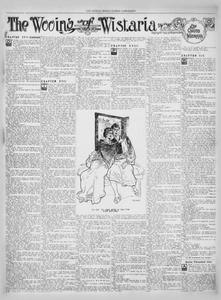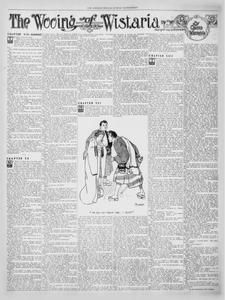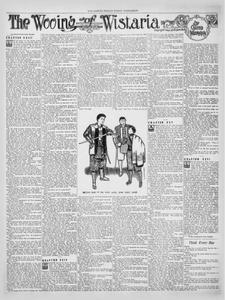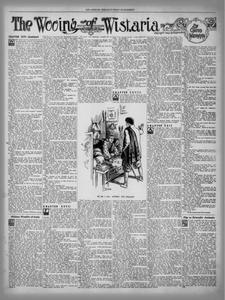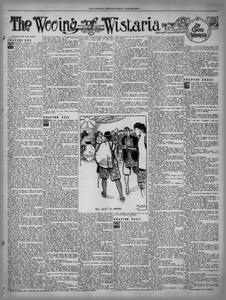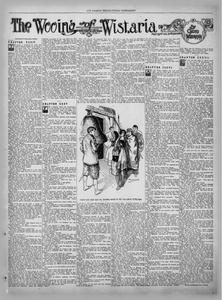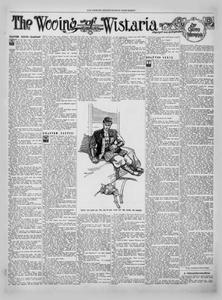Synopsis of Preceding Chapters
The earliest recollection of the Lady Wistaria goes back to the day when her father carried her in his arms to Yedo, where a great procession was passing through the principal street. Suddenly her parent raised his hand and pointing to a gaudily dressed man carried on a palanquin by ten stout attendants, told her there was the man who killed her mother, that it was he who was responsible for her need of a mother’s love. Wistaria now spent most of her time at the palace of her uncle, one of the samurai, known as the Lord of Catzu. Her presentation at court was at hand, and gowned magnificently, under the chaperonage of her uncle’s wife, the Lady Evening Glory, who had long prepared for the event, the girl made her official bow at the Shogun’s throne. But Wistaria had as much time for the good looking men of the court as the Shogun himself, much to the chagrin of her royal aunt. In fact, that lady was so mortified that she decided then and there that the girl should be banished from court, returned to Yedo, to learn once more the ways of the elite. On the way Wistaria’s many suitors tried in vain to slip her a note, telling of their love for her, but their plans were frustrated in all cases but one, which happened to be a young noble who attracted her attention at court. This suitor, however, is of the Mori family, who are hostile to the Shogun. His boldness increases when he finds that he is not rebuked, and before the journey comes to an end he succeeds in throwing a note into the norimono in which Wistaria is riding. The girl reads it, then sends a reply in which she tells of her appreciation of his attention, but cautions him against further actions, for fear of his life. The young nobleman is not daunted. He follows the girl to the palace at Catzu, hides in the grounds at night, and when morning comes approaches Wistaria’s window. The girl again cautions him of the danger he is running, but the young man proceeds to make love to her whether he die for it. Presently they are aware that their meeting has been discovered, and Wistaria, with a little cry, vanishes from the window.
The intruder proves to be one Catzu Toro, son of Lord Catzu. He at once engages the lover in sword combat, but is no match for him. After he is beaten he talks matters over with the enemy and the two agree to help each other, as Toro can be of assistance to Wistaria’s lover, while the latter agrees to do what he can for Toro, who is suitor to a young princess in the clan to which he belongs. Wistaria’s lover takes the name of Keiki in order that his identity will not be discovered, also adopting the dress of the Catzu clan. The Lord of Catzu receives his son’s friend (Keiki) with hospitality, giving him fine apartments in the palace. He even favors his suit for the hand of the princess, taking them daily on picnics up the river when the weather permits, never realizing for a moment that he is entertaining a member of the hostile Mori clan. Meanwhile the Lady Evening glory, who had been ill, recovers and starts in with a determination to break up the infatuation of the two lovers at any cost. She knows they are much interested in each other, but never dreamed that they had met to talk it over. She rises early one morning and entering the apartments of the princess unannounced, finds that little lady seated on the floor surrounded by flowers, which is evidence that she had a lover, a very bold thing to reveal in Japan.
Chapter VII – Continued
The Lady Evening Glory’s lips became a thin pursued line.
“The flowers? Whence came they?”
“From the honorable garden,” answered Wistaria, trembling.
“There is no tree in all the garden with blossoms in full bloom. They are only commencing to bud, and will not blossom before the first of April.”
To this undeniable fact Wistaria made no response.
“Answer when you art spoken to,” prompted her aunt, sharply.
“My lady—I do not know what to say.”
“Then you leave me to my own conjectures. You have a lover.”
“Oh, no, indeed!”
“What! Flowers fresh from the morning dew in your chamber, and you with you hair unbound! Pray when did it become an honorable fashion for ladies of our rank to venture out to purchase flowers before sunrise—and in such scanty attire?”
“My aunt, you are killing me.”
“Your health appears to me to be far from feeble.”
“I am innocent of any wrong,” said Wistaria, with a flash of spirit.
“Then you will not object to inform me who presented you with these flowers?”
“An honorable gentleman,” said Wistaria.
“Indeed! And what is this honorable gentleman’s name, may I ask?”
Wistaria hesitated. Then a sudden idea came to her. She smiled mysteriously.
“But I do not know his name,” she said, which was quite true, as she was unaware of her lover’s true name.
“You do not know the name of your lover!” cried her aunt, incredulously.
“Indeed, I wish I did.”
“Yet you accept his gift! You are entirely without shame, girl!”
“Oh, lady, the flowers were so beautiful I could not resist them.”
“Beautiful!” shrieked her aunt. “And because flowers are beautiful, is that an excuse for accepting the lover of some impudent adventurer?”
“Accepting the love!” repeated Wistaria, faltering.
“Yes, indeed, and you need not pretend ignorance of my words. They are quite clear to you, I have no doubt.”
“But—”
“You are well aware that by accepting the flowers you also accept his despicable love, and practically betroth yourself to this fellow. He shall be flogged for his impertinence.”
“Flogged!” cried Wistaria, becoming very pale.
“Flogged, I repeat,” said her aunt, coldly.
Wistaria shivered with apprehension. She had not until now grasped the real seriousness of her position.
“Your father,” continued the Lady Evening Glory, “shall be sent for this day. We shall see what those in authority over you think of your conduct.”
The aunt had but to mention the father to fill Wistaria with fear. She sprang to her feet and stood trembling among the scattered blossoms.
“I am guilty of no wrong, I do assure you, my lady aunt. But I arose to enjoy the sun’s awakening, and—and I did find these honorable flowers on my sill, and indeed they spoke to me of—of the coming summer, and so many things, dear aunt, that I was fain to take them in.”
“Then do, pray, my little dove, inform me what you know concerning this presumptuous fellow who placed them on your sill.”
“Oh, my lady, he is indeed honorably noble.”
“Indeed!”
“I do assure you. He is—” she broke off, painfully debating in her mind the wisdom of confessing the truth to her aunt.
“He is—?” repeated her aunt.
“Our own august guest.”
“Ah—ho! Then if that is so, you spoke a lie just a moment since when you said you did not know your lover’s name.”
Wistaria attempted to speak, but broke off, faltering and stammering piteously.
“May I inquire, then,” continued her aunt, relentlessly, “whether you are unacquainted with the honorable name of our august guest?”
“Oh, my lady, I do believe that—that he assumed another—only—just for the innocent romance of wooing me under an assumed title.”
“So! And pray how comes it, then, that my son’s honorable guest should also happen to be your lover? If in order to woo you he came hither under an assumed name, then it would seem that you had some previous acquaintance with him?”
“He followed our cortege from Yeddo, madame,” confessed the unhappy girl.
“What! You do not meant to tell me that he is that insolent Mori courtier of whom I heard only after my arrival home?”
Wistaria pressed her hands tightly together. She seemed overcome. Then suddenly she raised her head with almost defiant bravery.
“He is of the Mori clan, madame,” she said.
“The Mori clan!” The lady’s voice rose shrilly. “How came he, then, to enter our grounds?”
“He came, my lady, by the south river, where there is a break in the wall.”
“But how could he know this? Answer me that at once.”
“I—”
“Will you deign to inform me whether you condescended so far as to answer the love letters of this young man, for I have no doubt he favored you with many?”
“I wrote only one insignificant reply,” said Wistaria.
“And what, pray, did you say in this reply?”
“I implored him to follow us no farther. I besought him to give up the impossible exploit of entering our grounds, and, knowing what would be his fate if he attempted to do so, I also informed him that if he must indeed enter, to do so by way of the south river, that a portion of our grounds ran down to this honorable river and was unprotected by the walls, which otherwise surrounded us on all sides.”
“So it seems that you have betrayed to our enemy the weakness of our condition?”
“Not an enemy, lady! He is not, indeed.”
“And may I ask how your redoubtable lover, having gained entrance to our grounds, also contrived to wedge his way into the palace and become a guest of our hospitality?”
“Toro—” faltered Wistaria.
Her aunt’s face flamed.
“Toro, he discovered him the first morning, and—and—they became friends at once.”
“My son!”
“Oh, yes, madame, and on my two knees, I am prepared to beg you to show him mercy.”
“Keep your knees, my young lady, to beg mercy for yourself. You may have need of it ere long,” said her aunt, with chilling irony.
Chapter VIII
From the insinuations and threats of the Lady Evening Glory it might seem as if Wistaria’s lover were in imminent danger, and that the Catzu family might be expected to hasten instantly to cast him out from their province or have him imprisoned as a trespasser and imposter. But Japanese craft is more subtle. Besides, the right of judgment lay in the hands of the father of Wistaria, who was her natural and legal guardian. It was necessary, therefore, that the young man should, for the time being, gather no suspicion of their discovery. Consequently the Catzu family redoubled their expression of good will and friendship for their guest, while the only one who could have warned him was placed where she was helpless to do so.
With excessive sweetness, the Lady Evening Glory informed the courtier that she had heard such good reports of him from her honorable husband that she had risen prematurely from her bed of sickness in order to greet him and assure him of her solicitation for his comfort and pleasure during his stay in Catzu.
All these marks of friendship and compliment from the honorable lady of the house, besides the increased cordiality of the Lord of Catzu, would have been very delightful to the lover, but for the fact that almost coincident with the return to health of her aunt it was announced that the Lady Wistaria was unable to leave her apartments because of a sudden illness. The lover, therefore, in an agony of apprehension for the health of Wistaria had no heart or ears for the words of compliment pressed upon him by her family.
He spent his time roving restlessly about the grounds of the palace in the neighborhood of Wistaria’s casement, but the blinds were drawn tightly, morning, noon and night, and there was only the memory of the girl’s exquisite face at the window to torture the lover.
The arrival of Shimadzu, the father of Lady Wistaria, created no stir in the Catzu palace. He came silently at night. If any of the servants or members of the household knew of his presence they were dumb concerning the matter. The lover, consequently, was wholly unaware of his coming.
Shimadzu was closeted for some hours with his sister and sister-in-law. The Lady Evening Glory was bitter against her niece. Not merely the fact of the indelicate and unconventional manner of the courtship, nor even the fact that the lover was a member of their rival clan, and though his residence among them must have acquired information concerning their province which would be of value to his prince—not these things infuriated her so much as the thought that her son, the pride and joy of her life, the heir of Catzu, had been led by this stranger into an undertaking both perilous and shameful, the outcome of which was most uncertain.
The Lord of Catzu was milder and more lenient towards the guilty parties, possibly realizing in his inmost soul a measure of the responsibility. He endeavored to palliate their offense.
As for Shimadzu himself, he had not one word to say. He listened to the separate speeches of his sister and brother-in-law, and when they had concluded he simply requested that his daughter be ordered into his presence at once.
Wild-eyed and trembling, Wistaria was brought in. Gone from her face, pale and drawn with the intensity of her sufferings, was all the sun. During the three days preceding the arrival of her father she had been locked up alone in an interior room of the palace. No one had approached save her august aunt, who brought food with her own hands, and whose absolute silence inspired her with a great dread. She would speak no word, or even deign to look at the unhappy girl. Wistaria, rendered frantic by fears for her lover, had ofttimes thrown herself at her aunt’s feet, piteously beseeching that she would enlighten her as to the fate of her lover. But the Lady Evening Glory would shake her skirts icily and contemptuously from her grasp, to retire without a word of response.
Now Wistaria prostrated herself before the parent who had always inspired her with such incomprehensible fear. He motioned her to be seated though he himself remained standing. Mutely, mechanically, she obeyed him.
For a moment there was silence. The deep-set eyes of the father looked out at the young girl, noting the piteous tremble of the hands, the small, bowed head, the down-dropped eyes which dared no meet his own, and all the other evidences of her sufferings. Whatever the thoughts of the father, whether merciful or cruel, his impassive face revealed not his inner feelings. In some strange way this samurai seemed steeled against the pain of the world itself. Suddenly he spoke, his hollow voice smiting with a shock the frail, highly-strung girl.
“My daughter, had you a mother to love and guide you, you would not now be unhappy.”
He paused to note the effect of his strange words—strange because of the lack of emotion and sympathy that should have accompanied them. Wistaria raised her head painfully, but she did not speak.
“Therefore,” continued her father, “I wish to inform you that it is because of an enemy that you are now motherless, and therefore misguided.”
“An enemy?” repeated Wistaria, dully.
“And it is to take my revent upon this enemy that I am now about to impose a certain duty upon you which may at first seem repugnant. Before I do so, however, I wish to remind you that you come of a proud and heroic race, my daughter, no member of which has ever faltered in his duty. I would, therefore, my daughter, much rather see you strong and fearless than weak and trembling, as you now appear.”
Raising herself bravely, with a superhuman effort the girl grasped at her strength of will.
“My weakness, honorable father, is but temporary. Speak your august will with me,” she said.
“That is well,” returned the samurai, briefly. “I have a few questions first of all to put to you. I need not say that I expect truthful answers, and will tolerate no prevarication.”
The girl bowed her head with a certain dignity of submissiveness.
“Of what rank is your lover?”
Wistaria trembled.
“I do not know,” she replied, in a low voice.
“He has not mentioned his rank to you?”
“Only that he was of honorably insignificant rank.”
“Humph! Well, that is but a natural reply. What is his appearance?”
For a brief moment a gleam of strange pride came over her face. She pressed her little hands passionately together.
“Oh, my father, he is honorably noble, I do assure you. He possesses—”
“I did not ask for a rhapsody upon his merits,” interrupted the samurai, coldly. “However, I am satisfied as to his rank.”
A tear fell softly upon her little hand. Feeling, rather than seeing, her father’s irritation, she brushed it away impatiently, trying vainly to appear brave.
“Now,” resumed Shimadzu, half to himself, “if he is of noble rank it follows that he is close to the Mori family. Very good.”
He turned to his daughter.
“He is a good Imperialist?”
“He is honorably loyal,” she replied.
“Loyal to his prince, you mean, or his party?”
“Surely to both. He could not be otherwise. He is a brave and true gentleman, my father.”
“Very well, I have no more questions to ask you. I shall now outline to you the duty I have prepared for you. You are ready to obey my will?”
“In all things, honored parent.”
“That is well. I commend you for your filial words. First of all, I desire all possible information concerning the young heir of Mori.”
“But—” she faltered, “how is it possible for me—?”
“Your lover,” said her father, quickly, “is a Mori courtier. There is no doubt he will give you all the information I require.”
“Oh, then, my father,” she cried, clasping her hands together, “you will be lenient towards him, will you not? You will permit him to see me?”
“I have nothing against your lover,” said her father, with slight irritation.
“Oh, father!” In a moment her face was aglow with hope and happiness.
“I advise you to listen to me,” he rejoined, coldly.
“Speak! Speak, august father! I will follow your commands faithfully, joyfully.”
“I wish to know the nature of this prince, his habits, his mode of life, and the esteem in which he is held by his people. Once you have learned these facts, you mst secure for me specific details concerning his political schemes against the Shogun.”
Gradually Wistaria had rise to her feet. She had grown strangely pale. Her eyes were frightened and apprehensive.
“You desire,” she repeated, slowly, as though she scarce comprehended the words—“you desire to know the secrets of—of his honorable party?”
“Exactly.”
“You desire,” she began to repeat, “to know the secrets—”
“More than that.”
“More. You—you—my father, you would not injure his—his party?”
“Your apprehension, my lady, for a hostile party, is strange for one of your training. Are you, then, turned Imperialist?”
“No. I have no fear for myself, my lord. But he, he—You must understand, my lord, he believes in—loves his honorable party—whether right or wrong. I would not injure it because of his sake.”
“I have had enough of this weakness, my daughter, and you must admit I have been patient. To relieve your mind, however, of one thing, I will inform you that I have no designs against this young man or his party.”
“Oh, you lift from my heart, my honored parent, a weight too heavy for me to bear.”
“Pugh! It seems you are determined not to listen to my orders.”
“Speak at once. I will not again interrupt you.”
“Very good. While I have said I have nothing against this Imperialist party, I am, nevertheless, desirous of knowing all their plans and secrets. It will be your duty, therefore, to ascertain these for me. Do not interrupt—” as she made as if to speak. “You would say your lover is too loyal to betray his party secrets, even to you. Then you will use your wit to compel him to do so.”
“I—I will do so,” she replied, drearily.
“That is not all. I with you to force your love into betraying some scheme or intrigue of his prince which would, if brought to the attention of the Shogun, implicate him criminally. Now I have arrived at my chief desire—in other words, I wish to accomplish the ruin—the death of the Prince of Mori.”
Wistaria’s head swam in vertigo. She scarce could think or feel. Only one horrible thought hammered itself into her mind. By the cajolery and arts of a false woman she was to assist in the betrayal of the prince to whom her lover had sworn allegiance. It was revolting, cruel, horrible. The mere thought of it made her head whirl in dizziness.
When she attempted to speak, her words escaped her slowly in gasps.
“I can—not—do—that!”
A terrible expression came into her father’s face.
“You dare defy my authority?” he shouted.
“Oh, my father, put upon me any other task but this. It is base, cruel, cruel. And I—I am only a weak woman—”
“That is true. Do not, then, I advise you, attempt to pit your weakness against my strength. If you are so lacking in all those qualities admirable in a woman and a daughter of a noble race, I shall take means to force you to do your duty.”
A sudden wave of courage swept over her. She ceased to tremble, though the samurai was fierce and menacing. There sprang into her eyes a light of defiance.
“You have reminded me, my father that I come of a race of proud and heroic men. Then let me tell you that I, too, am conscious of possessing the intrepid blood of my ancestors, and that you can force me to do nothing against my will.”
As she spoke she had backed slowly across the room, away from her father, as though retreating from a blow. Now she stood against the wall, her arms spread out on either side, the hands clutching the partition.
“In ten minutes I shall show you, my lady,” said her father, between angry, clenched teeth, “the fate of one who dares defy her honorable parent.”
“Do so,” was her astonishing response. “Kill me, break all my honorable bones, my lord. We all must suffer and die!”
“You are too quick to choose your method of punishment, my lady. I have a more subtle means of teaching you the duty of a child to its parent. Do not imagine that I shall kill your body. It is your mind and heart I shall crush.”
“What do you mean, my lord?”
“You will understand, my lady, when your lover is paying with his life for—”
“Oh, no, no, no, no!” she cried, wildly, her hands groping through blinding emotion as though she would push away from her some horror too awful for utterance. “No, no, no!”
She fell down at her father’s feet, burying her face in the folds of his hakama, her hands clutched about it frantically. “Oh, my father—no, no, no!”
She could say no more.
“You will obey my commands?” inquired the father, bending over her.
“Yes, yes—oh, my lord—anything on earth you may command. Only spare him, I beseech you, I pray to you, as I would to a god!” She fell to moaning and crying with the weakness of hysteria, no longer brave, defiant.
He raised her not ungently. Holding her hands firmly, he looked sternly into her face.
“Listen to me, my daughter. The task may seem to you horrible. It should not be so. It is a righteous, holy cause you serve. I have sworn to the dead, pledged myself, to encompass a certain vengeance, which must not escape me now. I have lived for no other purpose. If I have seemed a cold, unfeeling father, stern, unsympathetic and unloving, it is because I have a mission in life greater than that of a father. It is you who must help me to attain this ambition. Vengeance—honest, righteous vengeance—for a wrong done me and mine in a holy cause. No Japanese girl can regard it otherwise. The Prince of Mori is our bitter enemy. We must accomplish his undoing—his death!”
“Yes, yes,” she said, between her chattering teeth; “and you will not harm him?”
“I repeat I have nothing against this man. It is his prince whose proud spirit I will break! Kill!”
“Yes, yes—only his prince—the old prince. You wish me to kill him? Yes, I will do so.”
“No; it is the young prince who must die—the son of the Prince of Mori. Do you not understand that I accomplish a more complete revenge by compassing the death of him who is the salt of his life?”
“Yes, yes; I see it clear. I must kill the innocent. Ah-h! Oh, it is cruel, cruel!”
She was weeping brokenly, piteously at his feet again, her physical strength quite gone.
Chapter IX
April danced lightly over the land. Merrily she flung her rainbow showers of sweetest water upon the earth, the trees, the fearsome grass which March had coaxed in vain to do more than peep its head above the soil. Now the land was covered with a mantle so soft and tender that its young life seemed a thing that it were wanton to crush beneath the feet.
Early, early in the morning, before the birds and flowers had cocked up their little heads to seize the first sun-kiss, a lover stood in a garden all made of gently sloping hillocks, crowned with trees whitened as if frost-laden, with the full bloom of the cherry and plum. And the lover’s voice called softly and tenderly to his lady’s casement:
“Lady Wistaria! My sweetest Wistaria!”
At first there was no response. Moving nearer the casement, he called again:
“Sweetest, dearest one, will you not come to your window for a minute—but a fraction of a minute?”
Softly a hand slid back the shoji—a slender, small, expressive hand of perfect form and contour, and then a young girl’s face appeared at the opening.
“Speak to me at once,” implored the lover, “for but a moment since I thought you a spirit. Dearest one, assure me that my passion is not in vain, and that my eyes deceive me when they fancy that your’s are sad.”
Her voice faltered and trembled at first. Gradually she steadied it.
“My honorable eyes,” she said, “are not always faithful mirrors of my heart. Yes, indeed, you are deceived, my lord. Look again. Surely you will see that—that they do smile.”
“Yes,” he replied, regarding her somewhat wistfully, “it is true. They do smile, and yet—” He hesitated. “You do not appear happy, Fuji-wara.”
A strange little laugh escaped her lips. But she made no reply. She had turned her eyes from his, staring out before her. As the trouble deepened in the lover’s eyes, he reached up, touching very gently the small white hand on the sill. The light touch of his hand startled her. Before he could speak she had recovered herself, leaning farther over to him. Her words sounded strangely harsh.
“My lord, do let us resume our conversation concerning this brave cause to which you adhere.”
He flushed warmly.
“It seems incongruous,” he replied, after a moment, “that a tender maiden should be interested in political conflicts.”
“That is very unkind, my lord. You do not credit me, then, with any other quality, apparently, than that of pale softness. Indeed, my vanity has saved me from the knowledge that the gods have been most unkind.”
“Nay, do not speak so,” he tenderly chid her. Of late he had chafed not a little at her persistent waiving aside of all tenderer subjects to discuss those of larger import to men alone.
“Well, then,” she persisted, “say that I am capricious, whimsical, what you will. But do, pray, humor me, and if I find it necessary”—she stammered over her words—“if I find it interesting to discuss such matters, pray allow me to do so.”
“Do so, then, at once, dear one! I am all ears to listen and all tongue to reply.”
“Pray tell me, then, are you truly an Imperialist at heart, or merely so in name because you are a Mori?”
“Pray tell me where my insignificant sympathies should lie, and there I swear to you shall they be.”
She protested that he but begged her question.
“Dear Wistaria,” entreated the lover, “I pray you do not disturb your gentle bosom with these questions which are meant for soldiers, not for maidens.”
“Nay, then,” she replied, and there were tears in her voice now, “why will you persist so? You are quite wrong, too. Let me repeat: I am the daughter of a family whose women have had their honorable share in the affairs of the nation.”
“True, but your house has stood always on one side only. They have never deigned even to hear the argument, the pious, patriotic cry of the other side.”
“My house! Well, my lord, and am I a house?”
He kissed the slender hand on the window-ledge. It reached just to his lips.
“Nay, I swear you are a goddess. It could not be possible that one so good and fair would favor an evil cause.”
“Evil? Ah, then, my lord, is the cause of my house an evil one?”
“I should be a traitor, my lady, did I take advantage of the friendly hospitality your house has offered me to repay it by sowing seeds of mischief.”
“But if the seeds were not mischievous, my lord? If they were worthy and good?”
He dropped her hand abruptly, and paced for a time up and down the small grass-grown walk beneath her window.
In the shadow of the room behind the Lady Wistaria another face appeared for the space of a moment only. Long, lean, cadaverous it was, wherein fierce eyes burned like living coals. With a shudder, Wistaria clutched her hand over her heart. Back to her casement came the lover.
“My sweetest girl, do not let us discuss so melancholy a subject.”
“Melancholy, my lord? Nay, you would treat me as a child. You would turn my heart from a lofty subject with the graceless remark that it is too melancholy for me.”
“Lady, I would turn your heart to the holiest of all subjects on earth.”
“Ah, what is that, dear Keiki— No, no, no! Pray excuse my honorable rudeness. Do pray, my lord, rather perceive my intense curiosity in the matter of which we have spoken. Then when you have enlightened me, speak whatever you will, my lord. I will listen.”
“And concerning what am I to enlighten you?”
“The question which cuts our country into two bitter factions, each defiant and warlike towards the other.”
Into the lover’s face there crept vague, baffled perplexity mirroring the thought beyond. Coquetry, or desire for political truth—which swayed his love? If the former, there was no combating it; if the latter, then—why then he would speak her true. He said:
“Will you tell me, then, whom you have been taught to regard as the ruler of Japan?”
“Why, our good Shogun Iyesada,” she returned, promptly.
“Yet he is not so regarded by every one in Japan.”
“Why is that?”
“Because there are many who would see our rightful sovereign, our divine Emperor, upon the throne.”
“But, my lord, his Imperial Majesty is, indeed, already upon the throne, is he not?”
“Only nominally, I fear, my lady, that you have not read the Dai Nihon Shi of the Prince of Mori?”
“No, but I am much interested in it.”
“The history,” continued the young man, with vehement bitterness, “was purged repeatedly by the Yedo censor of the Shogun. It dared to speak the truth to the people. I do assure you it was not destroyed, however, before it had done its work well.”
“How? Pray do tell me all about it.”
“Have you never heard that pious—fanatical, if will—cry, a barely half-muffled war-cry now, ‘Daigi Heibunor!’” (the King and the Subject).
An exclamation escaped the lips of the young girl.
“Oh, my lord, do not speak so loudly. I would feign warn you. I—I—”
She broke off in her agitation. But her apparent fear for him only filled her lover with a great joy. His voice softened.
“Fiji-wara, will you suffer yourself to listen hereafter to a confessed traitor?”
“Dear lord, traitor to the wrong?”
“Oh, dearest girl, can it actually be that you sympathize with our noble cause?”
“I—I—Tell me, do, pray tell me, with whom does the young Prince of Mori sympathize?”
“Oh, the rascal is a descendant of the Mori of whom I spoke just now.”
“And an adherent to his views?”
“Possibly.”
“You do not know for a fact,” she urged, tremulously, “just to what party the Prince does adhere?”
“My lady,” replied the lover, with some constraint, “the Prince has his pride of caste. He is also not without the inherited germs of patriotism in his soul.”
“And still they do say that he is as silly as a butterfly, and so given to frivolity that his head can hold no serious thought.”
“I do assure you,” replied the other, flushing warmly, “that our prince is not all he may seem.”
“My lord, I have conceived the most overwhelming interest in this young Prince Mori.”
“Indeed!” The young man started back in humorous dismay. The girl smiled now, a little, dreary smile.
“Be assured, my lord, that the interest is not of a sentimental nature. But it would seem that the young Prince was surely born for a great purpose.”
“Yes?” inquired the other, eagerly.
“And that is, to follow in the steps of his honorable ancestor.”
“Oh, dearest girl, you fill my soul with joy! I am ready to swear that your sweet heart beats for the right—the noble cause to which—”
“The Prince Mori is sworn?” she interrupted, quickly.
“Ay! and all the patriotic sons of Japan!”
“And what do these sons of Japan propose to do? What are the plans of the Prince Mori?”
“My lady!”
“Pray, why do you start so, Keiki-sama?”
“You ask a weighty question with the same lightness you would bestow if inquiring about the weather!”
“Then the tones of my voice do me injustice.”
“Wistaria, I swear I will not speak another word on this subject. No—not even to you.”
“But—”
“Did I arise an hour before the sun, think you, to preach politics to my love?”
“You recall the hour to me now. It seems I must bid you farewell. My maid even now is tapping on my door. Do, pray then, depart.”
The young man appeared cut to the heart at the parting. He sighed so deeply that Wistaria could not bear to gaze upon him, and, conscious of the impatient presence within, she drew her windows back hastily and shut out the sight of her lover from her. Then she faced her father within.
“You have heard all, honored parent?”
“Everything.”
“You are a witness of my continued efforts. I fear we have learned all there is to now.”
“Your opinion was not asked,” replied the father, coldly. “Your services are all I require. You will resume them to-morrow.”
To Be Continued Next Sunday
